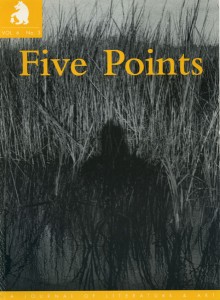Five Points, Vol. 6 No. 3
Fall 2002From Barry Hannah, “So much of writing is hard work, but you don’t want to admit that when you’re younger because you just want to be a flashing talent and be god-struck.”
Sample Content
Sidney Burris
The Death of John Keats
The new Sports Illustrated arrived late last week. The swimsuit issue. My father, who subscribed to the magazine his entire adult life, died in 1980, by which time I’d been married for five years, been to Europe and back, and done a year of graduate school. I was on my own, but I was also beginning to forge connections with my past, the kind of thing you do in your late twenties when you first seriously think you might be getting older and in danger of losing the things that made you who you are. I took out a subscription because I associated the magazine so strongly with him, and once a week, when I’d pull the magazine so strongly with him, and once a week, when I’d pull the magazine out of the mailbox, I felt weirdly as if I were my father, coming home from work in the afternoon. Sometimes, with the magazine under my arm, I’d walk into the house, take a shot of bourbon at the sink—sink-drinking, we called it—and chase it with tap water, the way he did every day of his life. I don’t do that anymore because the drinking was one of the things that finally made him very ill. So I think the magazine’s been good for me. I’m keeping up the family tradition of pouring money into a limply written New York glossy, and not drinking myself into a corner to boot. Not a bad deal. But the magazine does keep a little bit of my father alive, which is another way, a fairly healthy one, I think, of realizing that he’s dead, and that like him, I’m going to die as well. All this is not as simple as it sounds, at least not for me.
I have always been afraid of death. Once when I was a young boy playing in the backyard sandbox, I looped up and saw God in a top hat and tuxedo striding across the horizon. I was unimpressed, as I recall, with his getup because it seemed a bit over the top for a figure of such longstanding authority. I no longer question whether or not I saw God because I have a fanciful young song who assures me that I did. (For the record: the God that I saw was tall, lean, and angular, even slightly bony, but graceful, somewhat like Fred Astaire, as he paced across the horizon; and now that I think of it, he wore spats as well.) At any rate, I was told that God lived eternally, and I envied that. I also resented his proud swagger. I’d wear a top hat and tuxedo too if I could be spared my death. God was celebrating, doing his end-zone dance, because he didn’t have to worry about his demise. No way around it: death’s a terrible thing. “The Gods so consider it,” Sappho said, “or else they would die.”
But I do have to die, and so I do worry about it. I worry about it a great deal, and in various ways. Sometimes it’s just a slight depression, a morbidity of sorts, set in motion by a falling leaf, a baby crying, a tolling bell—no matter for whom—or a candle burning. At other times it’s a full-blown fear, as when I imagine the embalming fluid coursing through my veins, and my once vital fluids being flushed down the all-purpose, industrial-strength commode that crouches grimly at the end of the embalmer’s table. And the palliative phrases do me no good. When it’s over it’s over—this isn’t profound. Death and taxes—this isn’t true. Eternal rest—I don’t want to rest eternally. Death, the mother of beauty—I’d rather do without beauty. Death be not proud—were I death, I’d be proud as Hell.

